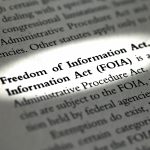When Controversial Speakers Come to Campus
Legal, Policy and First Amendment
By Clay Calvert
College campuses often are crucibles for free-speech controversies. The first eight months of 2017 were no exception, witnessing multiple incidents where conservative speakers like Ann Coulter and Milo Yiannopoulos drew opposition, anger and sometimes violence.
So what happens when a controversial person – perhaps a non-student who engages in what many people today would call “hate speech” and whose presence carries with it a possibility of violence – comes to speak on the University of Florida’s Gainesville campus?
As a starting point, the U.S. Supreme Court made it clear more than 45 years ago that “the college classroom with its surrounding environs is peculiarly the marketplace of ideas.” The premise of the marketplace of ideas is that all viewpoints and opinions – no matter how offensive or disagreeable they may be – should be allowed to come out. The competition of ideas, it is said, will help society discover the truth or the best idea at the time. And even if no one ever agrees on the truth, the process of testing and challenging accepted viewpoints is vital.
In fact, the University of Florida’s Student Honor Code provides that “as an educational institution, the University recognizes that the transmission of knowledge, the pursuit of truth, and the development of individuals require the free exchange of ideas on any subject whether or not controversial, self-expression, and the challenging of beliefs and customs.” In other words, the honor code embraces the marketplace-of-ideas notion.
The second important point is that the University of Florida, as a government entity and public university, is subject to the First Amendment to the U.S. Constitution. The First Amendment only protects speech against government censorship – not private censorship – so students, staff, faculty and others who step foot on the Gainesville campus are protected by the First Amendment. This would not be the case, however, were the university a private entity.
Two clauses of the First Amendment are particularly relevant when a divisive or provocative speaker arrives on campus – namely, the free speech clause and the assembly clause.
While the First Amendment protects speech against government censorship, the U.S. Supreme Court – the ultimate arbiter of the meaning of the First Amendment – has carved out several categories of speech that are not safeguarded. A common misconception, in turn, is that something called “hate speech” falls within one of these unprotected categories. In fact, there is no unprotected category of expression called hate speech.
The three most relevant categories of unprotected speech when a controversial speaker comes to campus are “fighting words”, incitement to violence and true threats of violence. Fighting words are personally abusive epithets spoken directly in a face-to-face manner in which the target of the speech is likely to swing back at or fight the speaker. Consider, for instance, the proximity of a baseball manager yelling toe-to-toe at an umpire. There is, by the way, no laundry list of words classified as fighting words. It all depends on how a word is used and to whom it is directed.
Speech that is designed to incite or provoke violence or unlawful conduct also is not protected, but only when the speech not only is intended to produce violence, but also when the violence is both imminent and substantially likely to occur. This is an important exception and may come into play when a controversial speaker requests space at the University of Florida. Most notably, when President Kent Fuchs announced on August 16 that the University denied the National Policy Institute’s request to rent event space, Fuchs explained that the “likelihood of violence and potential injury – not the words or ideas – has caused us to take this action.”
Finally, true threats are not protected by the First Amendment. These are words that would reasonably put a person in fear of imminent bodily harm or death. The Supreme Court, however, has not resolved whether the speaker must also intend to place the target in fear of imminent harm or death in order for the speech not to be safeguarded.
Another principle is extremely important: as a general rule, the First Amendment does not allow for a heckler’s veto. A heckler’s veto occurs when an audience’s hostile reaction to a speaker is allowed to silence and drown out that speaker. Think of an audience heckling a comedian off the stage at a comedy club. Under First Amendment principles, it is the duty of the government to protect the speaker from such a silencing effect. A famous example is when a court stepped in during the late 1970s to protect the Nazis’ right to march through Skokie, Illinois, where many Holocaust survivors resided.
Finally, government entities, including the University of Florida, are forbidden by the First Amendment from engaging in what courts call viewpoint-based censorship. In brief, the government cannot take sides on a particular subject. Imagine a law that restricts only pro-choice speech about the topic of abortion, but not pro-life speech or other perspectives on abortion. That would be a viewpoint-based law and it would be struck down as unconstitutional.
Now let’s turn to the portion of the First Amendment that protects “the right of the people peaceably to assemble.” Known as the assembly clause, this is particularly relevant for students, faculty and staff who object to a controversial speaker on campus. Those who object have a First Amendment right to peaceably stage a rally or demonstration against the speaker. This is known as counter speech. The counter speech doctrine teaches us that the remedy for speech that we don’t like is not censorship. Instead, it is more speech to counter the offending viewpoints or opinions. In other words, more speech should be added to the marketplace of ideas.
The University of Florida, in fact, has a policy regarding campus demonstrations. It provides, among other things, that:
Demonstrations may be held anywhere on the campus, so long as they do not disrupt the normal operation of the University or infringe on the rights of other members of the University community, except that no demonstrations are permitted inside University buildings.
Ultimately, it is highly unlikely that speaker-based controversies on college campuses will disappear anytime in the near future. When those controversies take place on public university campuses like the University of Florida, the First Amendment takes center stage, balanced against public safety concerns. Knowing the key principles above can help resolve these often knotty issues.
Clay Calvert is Professor and Brechner Eminent Scholar in Mass Communication in the College of Journalism and Communications, where he also directs the Marion B. Brechner First Amendment Project. He teaches both undergraduate and graduate-level courses on communications and media law issues, and he coordinates the joint JD/MA and JD/PhD program for the College of Journalism and Communications.
Posted: August 22, 2017
Insights Categories:
Legal, Policy and First Amendment
Tagged as: Clay Calvert, First Amendment, First Amendment Project, freedom of speech, hate speech, Journalism, Marion B. Brechner First Amendment Project, UF Research


